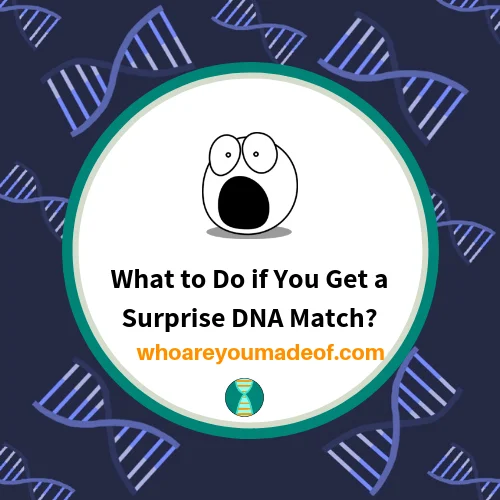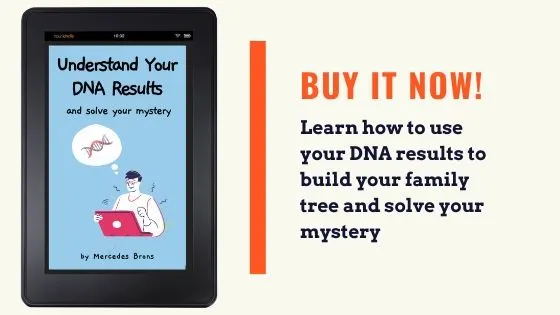In this post, you will find suggestions as to the first things that you should do if you get a surprise DNA match.
If you check your DNA matches and you find someone unexpected, what should you do? Should you contact them? Should you hide? Should you tell your family members?

This post primarily discusses DNA matches that we would describe as “close”. Of course, the definition of who is a close relative might vary from person to person.
Naturally, a new distant cousin match won’t potentially change your family dynamics as much as the discovery of a half-sibling or first cousin. You should definitely keep in mind the relationship that your new match may have to you as you explore the tips in this article.
Found a surprise DNA match? Relax and take a deep breath
The first thing that you should do when you find a DNA match that surprises you is relax. There is a lot that you need to learn about this person before you can be sure of your relationship.
Okay, so you have a mystery DNA match and they look like they are closely related to you. Definitely don’t freak out, hide, delete your DNA results, or tell anyone in your family anything definitive.
I’m going to help you figure out – as best as possible – exactly who this person is to you. In order words, how are you really related to your surprise close DNA match?
Taking a deep breath and diving in to some research about your match is going to help you understand exactly where they might fit in your family tree and will help you plan your next steps.
Should you tell your family about the DNA match
Before reaching out to your known family members to let them know about your DNA match, think carefully.
For obvious reasons, the implications of a surprise DNA match will vary depending on exactly how your new relative fits into your family tree and on the nature of your family. I always recommend that we learn as much as we can before we make excited (or otherwise) calls to our family members.
I remember when my mom first got her DNA results back. One of her top matches was someone completely unknown to us! My mom shared enough DNA with her to be half-siblings, but it turned out that they weren’t half siblings. Instead, they were first cousins, and the cousin was searching for their biological father.
Can you imagine the confusion and distress that might have occurred if my mom had contacted the DNA match introducing herself as a sister? Or if my mom had assumed that her dad strayed during his marriage to my grandmother and told all of her siblings about it?
It’s always best to know as many facts as possible and move with a cool head before telling family members about a new match.
Ignore the relationship estimate provided by the DNA company
You should take the estimated relationship that you see on your DNA match list as a suggested relationship. With a few exceptions, this relationship is only an estimate based on how much DNA that you share with your match.
DNA testing companies typically provide us with an estimated or predicted relationship to each DNA match. This is only an estimate and should not be taken at face value without further investigation.
The DNA testing companies use the amount of DNA shared between two people in order to estimate how closely related they might be. Unfortunately, for most relationship distances there are several types of relationships that can have the same amount of shared DNA.
For example, two women who share 1400 centimorgans of DNA could be half-sisters. They could also be niece and aunt to each other. Or one woman could be the other woman’s grandmother.
As you can see, there is a definite close relationship! The question is which close relationship is the one that these two matches have?
When it comes to your own surprise close DNA match, the answer to this important dilemma is going to affect how you proceed as far as whether to discuss with other family members, whether you contact the match, and how you feel about the entire situation.
How much DNA do you share with your surprise match?
Carefully examine the amount of DNA that you share with your new DNA match and use that number to learn all of the possible relationships that you could have with your match at that level of shared DNA. You will be able to use other information that you learn about your match to eliminate some of the possibilities.
You can use a DNA Centimorgan Chart, or read my post about shared centimorgans to help figure out the relationship possibilities.
Write down all of the possibilities – you’ll be able to eliminate some of them using some of the strategies that I mention in this post: DNA match checklist.
Which DNA matches do you share in common?
You should check to see which DNA matches that you share in common with your surprise DNA match to see if they are a paternal/maternal match, and to get clues about which ancestor you might share in common.
For example, if the DNA match shares maternal second cousin matches with you, they might be related to you on your mother’s side of the family. If they only share your paternal half-cousin in common, they might be related through only one of your grandparents, or the parents of your grandparent.
Can you compare family trees with your match?
Your DNA match might have a family tree attached to or posted on their profile page. If you know your own family tree, you can compare yours to theirs to see if you find any common surnames or geographic locations.
These are just some observations that we can make to help us get a general idea as to how our match is related.
Don’t forget to take notes – just in case information on your DNA match disappears
Just as you are surprised by the DNA match, the DNA match might also feel surprised by his or her results. Every once in a while, this might lead the DNA match to delete their family tree or even delete their DNA results.
This is why I always recommend that people write down the information that they learn about their potential relationship with the DNA match on a piece of paper. Some people recommend taking screenshots of things like family trees, just in case they are no longer available for whatever reason. I like to write things down, but that’s just me!
Should you contact your unexpected close DNA match?
Once you’ve learned as much as you can about who your DNA match is (and isn’t), you might be interested in contacting them. Most of the time our DNA matches are very willing to communicate.
Since your unexpected DNA match is relatively closely related to you, it is best to keep this in mind during communication in order to set the stage for potential developing a good relationship in the future. They are family, after all.
It’s up to you whether you would like to reach out to your match – you certain don’t have to. In fact, you could wait to see if they contact you first. If you decide that you might like to send them a message, you might be interested in these posts about contacting DNA matches:
Conclusion
I hope that this post helped you feel more empowered to move forward with understanding how your new close DNA match is related to you. If you have any questions about something that you read in this post or if you would like to share your own experience with a surprise DNA match, I would love to hear from you in the comments below.
Thanks for being here today!



Dennis Cox
Sunday 26th of November 2023
Back in 2018 I received results of DNA screening done with Ancestry. At the time I was seeking to learn the identity of my biological father, an effort which proved fruitful. I located a first cousin who led me to half-siblings. That satisfied my "need to know".
But then a first cousin appeared in my Matches list with 1017cM and shared matches with many of my other paternal matches. When I made contact through Ancestry messaging, she denied any relationship with my paternal family which led me to believe she had been either 1) conceived out of wedlock (as I was), or 2) was given up for adoption and didn't know of that occurrence. She still does not acknowledge the relationship even though we know DNA does not lie.
Then in 2019 I received a phone call from someone claiming to be a half-sister on my maternal side. Before I returned the telephone call, I checked my DNA match list and found the individual listed as a half-sister with 1741cM, higher than a known half-brother. I made contact and we compared notes. Turns out our mother had two relationships resulting in pregnancies. I was the first, kept and raised by my natural mother; my half-sister was given up for adoption at birth. Through unexpected DNA matches, I have learned of eight half-siblings, seven living, with which I have strong connections that otherwise would have gone unknown except for making contact once the initial matches were pursued.
The first cousin who refuses to acknowledge the relationship is the only disappointment when pursuing DNA leads.
Lori
Sunday 26th of November 2023
Backin 2015 when my husband and I took our dna (Ancestry) I had a "1st cousin" match and wrote to the person as I could not imagine how I had a cousin I did not know about. The person I contacted did not respond back to me for 8 months as she said she rarely checked her Ancestry account. She said she and I were not a match but she was administrator for her brother who had been adopted. I began to shake and cry as I knew that was my sister's son she'd given up for adoption in 1978. I had offered to take him but my sister said no as I had two small children. The woman told me her brother's name and I reached out on Facebook and within a week he'd met many in our family. Unfortunately, my sister had passed from cancer in 2011. Patrick is now part of our family and like I told him, we are his "bonus family" as we never wanted to take over his family he'd been raised in as he was adopted by a good family. Then in 2017 I decided to do 23 and Me and I found another "1st cousin". What the heck? She, too, had been adopted! Her dad (my maternal uncle) had had a 3 month affair with a married (but separated) woman who went back to her husband. When this cousin was born she looked just like my uncle and was given up for adoption. She stays in contact with her newfound 5 half siblings and has made some strong relationships with my cousins and their children. I got to meet her and am in contact with her also. I was never looking for either but was blessed with finding them and being able to connect with both. I've also become friends with about 20 of my dna cousins as we are connected on Facebook, and one distant cousin and I email regularly. I absolutely love being connected like this! We've shared genealogy when possible. Some of my dna cousins I have no idea how we relate as we cannot find our common ancestor- but we've become friends anyway. FUN! I'm also friends on facebook with two dna cousins (sisters) as we connected through a family renunion that has been going on for over 100 years. We know how we connect (our 2 x's great grandfathers were brothers) and we share a large and interesting family history. I love both of them and we've met up a few times. Through one of them I was able to connect with a 3rd cousin and he and I have spoken on the phone. His grandma and my great grandma were sisters. We were able to talk about family and had a blast! He and I are friends on facebook and if he ever makes it back to Ohio we plan to meet in person. I sent him a link to our very large shared family tree on Wikitree. I LOVE these connections and find them real blessings!